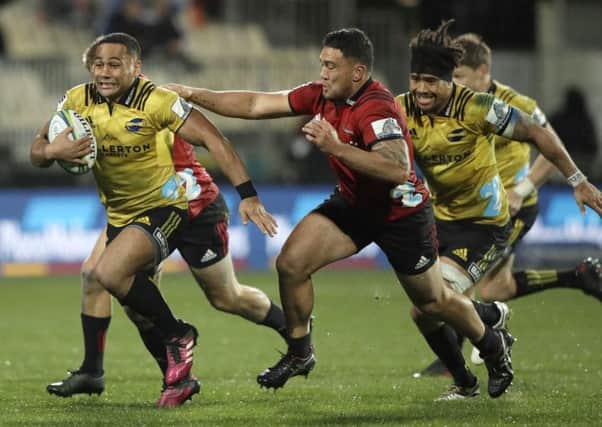Super Rugby in crisis '“ and PRO14 plays copycat


One South African website (sport24.co.za) posted this headline last week: “Super Rugby is dead”. RIP. Only one day later the Canberra Times led with: “Super Rugby is dead and the Aussies should go it alone” before adding: “This competition is dead in Australia. Finito. Over.” Last week the Guardian ran an article entitled: “Super Rugby is gravely ill but its last breath has yet to be taken,” which almost counts as optimistic in the circumstances.
Meanwhile the chief executive of the Brumbies, Michael Thomson, sent a begging letter to the club’s fans saying “please, please, please come and watch us next weekend” (I paraphrase). He ended this email with the dire warning: “Without your support and those funds the Brumbies may no longer exist.”
Advertisement
Hide AdAdvertisement
Hide AdThomson sent his embarrassing plea because the Brumbies are on course to beat their worst ever attendance figures. They are averaging crowds of only 8,464 this season and a modest 5,283 watched their last home game against the Rebels. So much for the new Super Rugby format that puts a premium on derby matches.
There are some Australian-specific problems. The most obvious is that they can’t buy a win against New Zealand teams, at least until last weekend. The Waratahs’ victory over the Highlanders was the first Aussie win against a Kiwi franchise in 41 matches.
Furthermore Super Rugby is only the fourth most popular form of “footy” in Australia, behind Aussie Rules (2017 average gate 35,300), Rugby League (15,700) and even Soccer (12,600). Australian Super Rugby teams attracted an average gate of 11,300 in 2017 (although the data was incomplete). Those numbers are not bad but they are a long way short of the 18,642 average achieved in 2012, which proved to be the high tide.
But the disinterest of the fans isn’t unique to Australia. When the Crusaders hosted the Waratahs in round 13 they were reportedly watched by fewer than 6,000 fans (no official numbers were given). The same is true of the Sharks/Stormers match in round 10 when Kingspark was almost empty (again, no figures available).
Despite the tournament jettisoning three of the weaker franchises, two of which fetched up in the Guinness Pro14, Super Rugby is going through some sort of existential crisis.
It is generally acknowledged that Super Rugby expanded too fast and too far. The Anzac nations bitch about the fly time to South Africa and the jet lag when they get there and the South Africans do the same when going in the opposite direction. Everyone moans about flying to Argentina and the Japanese Sunwolves are obliged to play matches in Hong Kong and Singapore, where they are largely reliant on the exile community for support, just to cut opposition flight times.
Back in 2016 someone worked out that the Sunwolves flew for 50,173 miles, or twice around the world, to fulfil their fixtures. They are said to have sat on planes for a bum-numbing 113 hours… just shy of three working weeks.
The Sunwolves are seen as one of the weakest links in Super Rugby’s chain but they have won back-to-back matches, including a 63-28 victory over the Reds, while the other “problem” team, the Jaguares, are on a six-match winning streak.
Advertisement
Hide AdAdvertisement
Hide AdBut while most teams are competitive, Kiwi teams dominate.They have won five of the last six Super Rugby titles just as the All Blacks have won five of the last six Rugby Championships. The most attractive aspect of the Six Nations is that it is wide open every year, while three different nations were represented in the Champions Cup semi-finals.
One website produced ten reasons why Super Rugby is dead and they had all the usual gripes about ticket prices, the similarity to Rugby League, complex laws applied in an arbitrary manner, the loss of marquee players to English/French clubs and so on. But it is the contrived nature of the competition, conferences designed to provide derby matches and to ensure the Kiwis don’t dominate the play-offs, which alienates the rugby fans as much as anything.
That brings us to the Guinness Pro14, which has obviously studied Super Rugby’s mistakes closely and seems determined to copy as many as possible.
It has already expanded, first to Italy where we were promised huge financial benefits from a country of 60.6 million, 60.5 million of whom have never heard of the Pro14.
Thence to South Africa through Super Rugby rejects the Southern Kings and Cheetahs. The latter showcase an exciting brand of running rugby which took them into the play-offs but the Kings won one game, all season, the crowds largely stayed away from summer rugby and overall the South African teams subtracted rather than added “rugby value” to the competition, just as the Italians had done before them.
And the new Pro14 is contrived. The format requires teams in Conference A to play teams in Conference B only once, home or away, but the Pro14 stapled two extra fixtures on to the season to be played at their discretion just to ensure more local derbies. So the 1872 Cup is now played over three legs rather than one or two. It is artificial, it is done for financial rather than sporting reasons and the fans know that.
“The golden goose became a turkey and it’s now a dodo,” was how the Canberra Times article described Super Rugby.
Look closely and you may see signs that the Pro14 goose is also turning into a turkey.